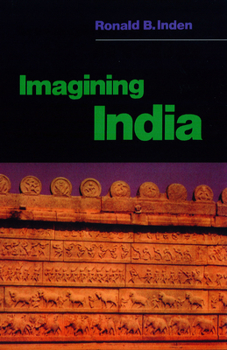Imagining India
Select Format
Select Condition 
Book Overview
"An important book, a major work, that must be read and absorbed by those involved in scholarship, or any critical enterprise." --The Independent
How does the Western world represent India? To what extent is knowledge of the people and institutions of the Indian sub-continent based on the West's own desires for world hegemony, and fantasies about its rationality? In this controversial and widely-praised book, Inden argues that the West's...
Format:Paperback
Language:English
ISBN:0253213584
ISBN13:9780253213587
Release Date:December 2001
Publisher:Indiana University Press (Ips)
Length:312 Pages
Weight:0.95 lbs.
Dimensions:0.7" x 6.0" x 9.0"
Grade Range:Postsecondary and higher
Related Subjects
Americas Asia Education & Reference Europe History India Politics & Social Sciences Social Sciences WorldCustomer Reviews
3 ratings
Outstanding
Published by Thriftbooks.com User , 15 years ago
Inden's survey is profound and outstanding. 'The Anglo-French Imperial Formation', is the name Inden gives to the like of James Mill, Vincent A. Smith and A.B.Keith, to mention but a few, who set out to find the justification for the West to impose its rule over India. This 'Formation' propounded the view that the Hindu Civilization, religion and modes of thoght have been essentially feminine and sensuous governed by a disorderly imagination instead of by a world-ordering rationality.Having accepted the Aryan Invasion Theory and since the West itself is Aryan, the 'Formation' had to find why Hindu Aryans were so different from the Western Aryans.They first said that the robust Aryans worshipped those 'physical forces before whom all nations, if guided by the light of Nature,instinctively bowed', but that as they advanced into the steamy Gangetic valley, their mind and ideas got warped under the extremes of clime there.But then, the Upanishds were composed in 1000- 500 BCE when the Aryans were in the Gangetic Plains.Some intellectuals have spoken very highly of these Upanishads. A.B.Keith, however, had devalued the Upanishads saying the value of the thoughts there was small.Others called them as cloudy mysticsm.Inden points out that Deussen, for example, had said of them,'the fundamental conception of Plato ad Kant was precisely that which already formed the basis of Upanishad teaching' The further downgrding of Hinduism was effectuated by the 'Formation' by declaring that the Aryan religion became overrun with the feminine Dravidian Ideas 'concerned with agricultural and human fertility and obssessed with their female source, the Mother'.As regards this, structuralists like Biardeau, showed how Hindu culture is "an integrity comprising of inter-related parts, and the Godess is a fundamental category of Hindu consciousness and in her various forms an integral part of Hindu ensemble of deities and complements Vishnu and Siva as much as they do each other". Caste has come in for a lot of criticism. But, Radhakrishnan, describing caste as classes, says, that that model of order was a logical and complete system for the division of labour and of man's nature. He was of the view that classes later degenerated into castes. Inden postulates that this distinctive instituion of Indian Civilization does not appear tll the thirteenth or fourteenth century at the earliest and castes were the effect of collapse of Hindu Kingship. Similarly Inden contrasts the disparaging views of the members of 'the Fornation" and of others as regards,Hindu Kingship and assemblies. For reasons of space, I am not setting them out. In any event, they are now of no relevance It is worth pointing out, as Inden has done, that the physical basis of Western Rationality and Certainty,that of Newton and Descartes, has come to be quetioned. This is consequent on the discovery of the dual nature of fundamental particles, Heisenberg's uncertainty principle and Einstei
An important book
Published by Thriftbooks.com User , 23 years ago
To place modern scholarship on India in the proper context, it will be helpful to read this book. Inden dissects the colonialist prejudices of these scholars and shows how a lot about India that we take for granted is actually a construction of these Indologists.
Deconstruction of Indology
Published by Thriftbooks.com User , 23 years ago
Inden's book is commendable for giving a clear, thorough and courageous analysis of why scholars of many ilks have given the distorted image of India that we have today. The British wanted to justify their empire and loot, by positioning themselves as the civilizing force. The Germans built their "Aryan" identity as being at the center of history. The Jungians constructed the West as being rational and progressive, as compared to the 'world negating', irrational and mystical Indians. Post-independence Indian Marxists wanted to 'qualify' India for Marxism by having to prove its feudalistic character. All these served to build and solidify the theory of India as a sponge of civilization and with no agency to originate anything worthwhile. No wonder then that most treatments of India begin and end with caste and the multitude of social evils - all deemed too quickly to be its inherent qualities. Yet there is little coverage given to the appropriations by Westerners from India. Inden's book should be read by everyone with a serious interest to understand India.






